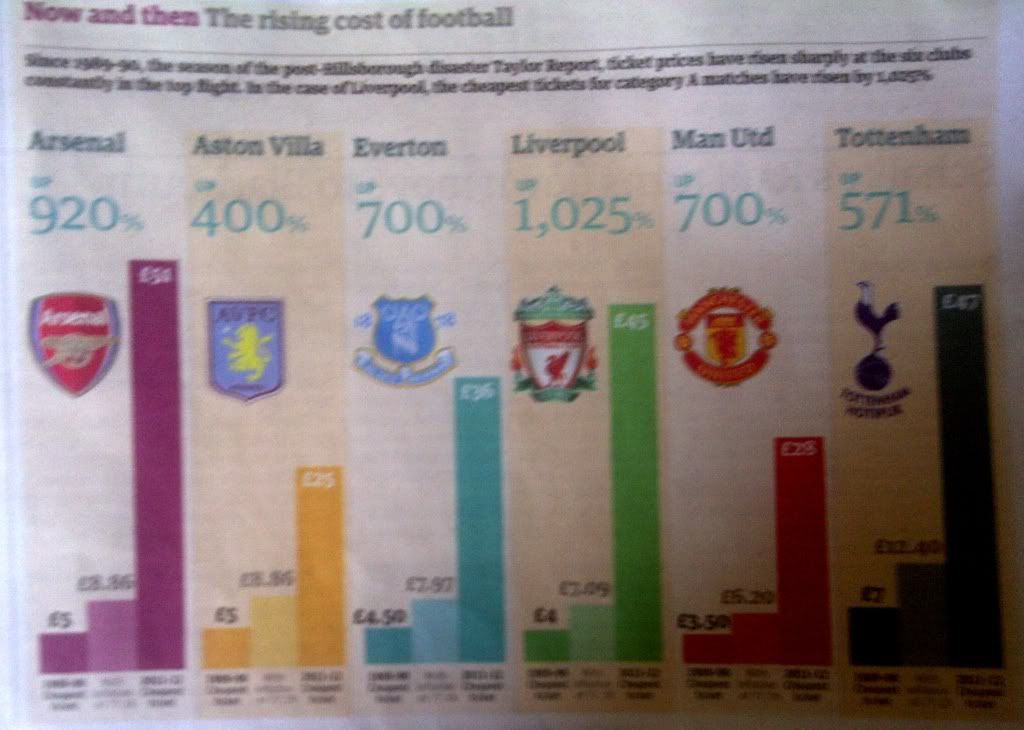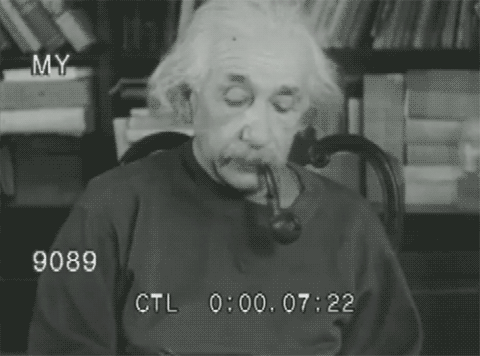Good article this.....but, for all of you who have an aversion to reading, hit "back" as this is quite long, almost certainly too long for you
In the 20th year since the First Division clubs broke away from the Football League to keep the new satellite TV fortunes and form the Premier League, money has transformed the game – and the price of watching it. As the gradual changes each season are contemplated – 6.5% increases at Arsenal this year; prices frozen at Stoke City, the £10 adult ticket at Blackburn Rovers – awareness fades of the mighty disparity between what fans pay now and the prices before the Premier League was formed.
In 1989-90, the year of Lord Justice Taylor's report following the Hillsborough disaster, in which he recommended stadiums become all‑seat, fans watched Alex Ferguson's Manchester United play the very top clubs for a cheapest price of £3.50. With cumulative inflation of 77.1% since, according to the Bank of England, United supporters who stood on the Stretford End or United Road terraces then would now pay an equivalent £6.20 to watch Ferguson's Premier League champions. But the cheapest ticket at all-seat Old Trafford this season is £28, lower than at other top clubs yet still representing inflation of 700%. Mostly, United's prices are higher; the £28 seats are available only in the lower tiers of the East and West Stands, not in swathes as they were across the terraces of old.
Matches against the clubs in Arsenal's current category A price, Chelsea, Liverpool, Tottenham Hotspur, Manchester United and Manchester City, could be watched in 1989-90, on the North Bank at Highbury, for £5. Now, at the 60,000-seat Emirates Stadium, which is becoming noted for high prices and including English football's first £100 seat, the cheapest ticket for a category A game is £51. That represents inflation, since the Taylor Report, of 920%.
After the wreckage of Hillsborough, the Football Supporters' Association argued against all-seat stadiums, principally because it believed clubs would use them as a platform to raise ticket prices. When addressing and rejecting that argument, Taylor famously wrote in his report: "Clubs may well wish to charge somewhat more for seats than for standing but it should be possible to plan a price structure which suits the cheapest seats to the pockets of those presently paying to stand."
The judge cited a price of £6 for seating at Ibrox Park, quaint compared to the prices now at the grounds, rebuilt according to Taylor's recommendations and which formed the foundation for football's revival. "I do not think Taylor saw the commercial revolution around the corner, beginning with the increase of television money," Rogan Taylor, chair of the FSA then, now director of Liverpool University's football industries group, says.
"Of course, the grounds have improved out of all recognition, but the ticket price increases have not mostly been necessary to pay for that – they are now going into the arms race of escalating players' wages. When I go to Liverpool now [cheapest adult price £45 for category A matches compared to £4 in 1989-90] I don't mostly see a bourgeois, middle-class crowd, but ordinary people who must be stretching to afford it. And the two groups who were clearly excluded when the prices went up were older people who had stuck with the game through some terrible times, and young people."
For all the game's problems in the 1980s, watching football was a rite of passage in which children, mostly boys, graduated from being taken to matches, to watching as young men, with very few excluded because it cost too much.
The figures from 1989-90, collated for the Labour government's Football Task Force, show the cheapest season ticket at Anfield was just £60 and £96 at United – the equivalent prices with inflation would be £106 and £170 now – but the actual lowest-priced season tickets this season are £725 at Liverpool and £532 at Old Trafford (1,108% and 454% inflation respectively).
Clubs were usually neither sophisticated nor commercial enough then to conduct demographic analysis of their own supporters, but the memory and images of young people at grounds are borne out by research done at the time by Leicester University's Sir Norman Chester Centre. Surveys of fans were carried out for Coventry City, in the old First Division, finding in 1983 that 22% of supporters were aged 16-20. At Aston Villa in 1992, 25% of the crowd was 16-20; at Arsenal, 17% of fans were 16-20.
Premier League surveys for years show a consistent reduction in the proportion of young people, who pay full price from 16. By 2006-07 the proportion of fans aged 16-24 was 9%; in 2007-08, the figure was 11%. Last season it bounced back to 19%, which the Premier League said was due to improvements in the way its survey is carried out.
The average age of a supporter now, according to the Premier League's research, is 41 – the core whose loyalty was nurtured when attending games was affordable to almost all.
"We must accept that some people feel they are excluded because they cannot afford the prices," the Premier League's spokesman, Dan Johnson, acknowledged. "But many clubs work hard to attract fans with affordable deals, and there are different opportunities to attend.
"Twenty years ago many people were excluded for different reasons: the atmosphere was hostile and many grounds inadequate. We argue the experience has improved enormously, crowds have increased hugely, and a wider section of society feel comfortable coming to football."
Crowds do remain at historic highs. The average Old Trafford attendance last season was 74,864, just below United's 75,769 capacity, while at the Emirates Arsenal played to crowds averaging 59,930, nudging full houses of 60,361. Overall, Premier League grounds were full to 92% of capacity, down from a high of 94% in 2005‑06.
Clubs in poorer, northern areas, including Bolton, Blackburn and Wigan, are working hardest to maintain crowds, so offering the cheapest deals. In this recession, though, the top clubs cannot assume fans will keep paying a large slice of their incomes on expensively priced football tickets either. On Tuesday, more than 4,000 Old Trafford tickets remained on sale for United's match on Monday against Spurs. After years of sell-outs United – since their US-based owners, the Glazers, began to raise ticket prices – have not been guaranteed to fill the ground.
"Some Premier League clubs do offer good deals," says Malcolm Clarke, chair of the Football Supporters' Federation, "but the prices at top clubs, and particularly London clubs, are mostly outrageous. They are beyond the reach of many younger people who used to have access to football, and now, if they are interested, they are watching the game in the pub.
"Football, by tradition, was always accessible to almost everybody, and in the current economic climate, with jobs and standards of living under threat, there is a great danger an increasing section of the community will be priced out."
Football's glittering success since the Premier League was formed tells a contradictory story: the clubs operate well-respected community programmes aimed at "social inclusion" for young people in their neighbourhoods – while mostly pricing them out of going to matches.

The mancityfans.net football forum
The BEST FORUM in all the land and all the world














